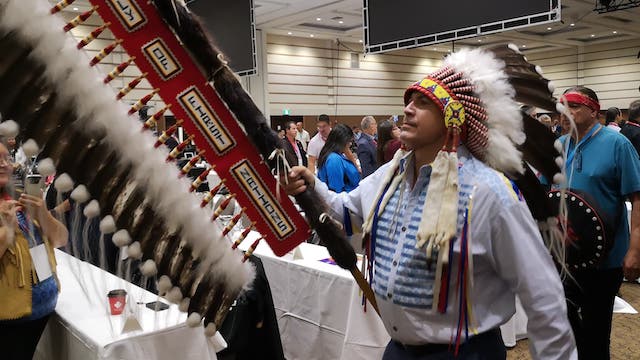
Assembly of First Nations National Chief Perry Bellegarde reiterated his core message of the past year that the federal government has made progress on First Nations rights but have much work ahead. Photo: Justin Brake/APTN.
The Liberal government’s track record and First Nations influence in this fall’s federal election were front and centre Tuesday in Fredericton as the 2019 Assembly of First Nations’ Annual General Assembly got underway.
“First Nations priorities are Canada’s priorities. First Nations issues are Canada’s issues,” AFN National Chief Perry Bellegarde told delegates gathered at the Fredericton Convention Centre in unceded Wolatoqey territory, as federal representatives Crown-Indigenous Relations Minister Carolyn Bennett, Bennett’s Parliamentary Secretary Marc Miller and Conservative Opposition Critic for Indigenous and Northern Affairs Cathy McLeod looked on.
“So if you want to become prime minister or a member of parliament you better listen to our people and our issues and concerns because we vote now and we are important and we have impact. That’s what’s going to happen in October. We’re not going to be pushed to the side anymore.”
Bellegarde’s message followed recap of what the AFN leader noted as successes on policy and legislative fronts, including the recent passing of the Indigenous languages and child welfare legislation.
But every achievement Bellegarde noted, like the dozens of long term drinking water advisories that have been lifted under the Trudeau government’s tenure, was accompanied by acknowledgements of remaining crises.
“Yes we’ve seen the boil water advisories on reserve go down from over 130 down to 57. Good movement, positive movement,” Bellegarde said in his address.
“But yet today the people of Attiwapiskat and Eabametoong can’t drink their water, can’t bathe in their water. There’s still a water crisis.”
Bennett later addressed the assembly, echoing Bellegarde’s admission that more needs to be done, but assured leaders the government is working on a path of reconciliation and decolonization.
“You have a constitutionally protected right to self-determination and self-government, but it has to be based on how you want to define and govern yourselves, based on your laws and your traditional practices, and how you want to describe your relationship with the Crown,” he said.
“Only together can we address Canada’s legacy of colonialism and the barriers you have faced under the Indian Act which still regulates almost every aspect of community life on reserve, literally from cradle to beyond the grave. We need to make it easier for your nations to get out from under the Indian Act. You are doing the hard work and setting the path for decolonization and reconciliation.”
But some delegates weren’t happy with the minister’s platitudes.
“She talks about nation to nation, and so does Trudeau. He says the same thing: nation to nation and reconciliation,” said Hart Perley, proxy for Tobique First Nation Chief Ross Perley.
“Well, you know what? Canada is not a nation. It never was and it never will be. Canada is a corporate state. And as soon as you look at that and recognize that and admit it, then maybe the Indigenous peoples across this land will start believing what comes out of your mouth,” she said as some delegates applauded her message.
When AFN organizers encouraged her to wrap up, Perley asked Bennett directly: “When, Ms. Bennett, did Canada become a nation? And when, Ms. Bennett, are you going to stop lying to the Indigenous peoples right across this country?”
Multiple leaders criticized the Liberals for splitting Indigenous and Northern Affairs Canada into two departments in 2017 without consulting First Nations.
The result was Bennett’s new department, Crown-Indigenous Relations and Indigenous Services Canada.
While Bennett lauded the move, saying it would facilitate First Nations’ move toward self-determination, some argued Tuesday that decisions of such significance shouldn’t be done without First Nations’ inclusion and support.
The federal election will remain a focus Wednesday when Indigenous Services Minister Seamus O’Regan, Green Party Leader Elizabeth May, McLeod, and NDP MP Guy Caron all address leaders.
The National Inquiry into Missing and Murdered Indigenous Women and Girls’ final report will be a featured topic of discussion Wednesday, as will the Trudeau government’s efforts to overhaul major policies dealing with First Nations Aboriginal and land rights.










